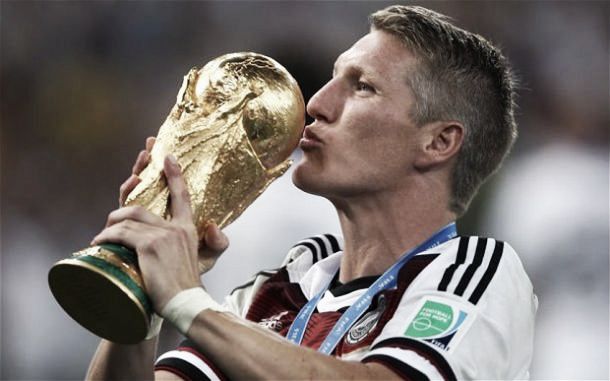On 13 July 2014, the dream came true for Bastian Schweinsteiger - Germany had finally pulled through to win an international tournament with a group of players, one of the most talented generations of German footballers, who had come so close on previous occasions only to fall at the final hurdle - Many in last-chance saloon due to the inevitable prying fingers of age.
At the Maracana, which many consider to be the heart of football, an iconic stadium with incredible history and drama locked eternally within those hallowed grounds, Bastian Schweinsteiger firmly cemented his status as not just one of the finest players Germany had ever produced, but a modern legend of the game. A savage cut under the eye after taking an elbow to the face was not going to stop him from almost single-handedly hauling an injury ravaged and visibly exhausted Nationalmannschaft to World Cup triumph - He bled for his teammates, he bled for Germany, he bled for immortality.
It is hard to believe that things could have easily been so much different - But his love for football and a gut-feeling about where his destiny laid made his decision for him after having to choose between the beautiful game and a career in skiing. As one of the brightest young talents in the sport, Bastian Schweinsteiger grew up travelling and training with renowned German skier Felix Neureuther, even being tipped as a future Olympic hopeful. However, when Bayern Munich came calling in 1998 with an offer to join them as a youth player, one thing lead to the other, and the youngster decided to give up skiing for a full-time career in football in 2001.
“I enjoyed both sports, but then a full time offer came from Bayern Munich and I just had a gut-feeling it was right. Football was so popular, and skiing was never like that. Carrying those skis around was annoying too”
-Bastian Schweinsteiger when discussing his decision to take up a career in football in 2006
After having won the German youth championship in July 2002, Bastian Schweinsteiger was fast-tracked to Bayern Munich II, where he proceeded to put in a number of eye-catching displays in the third division. There were questions about his temperament in those early days, though, and the prodigiously talented youngster started gaining the reputation as something of a rebel off the pitch - Raising doubts not about his unquestionable talent, but whether he would be disciplined enough to actually realize this immense potential. However, as his impressive rise continued, then-Bayern Munich manager Ottmar Hitzfeld handed him his debut after only two training sessions with the first team in the UEFA Champions League game against RC Lens in November 2002 - Alongside a young full-back named Philipp Lahm, with whom Bastian Schweinsteiger would eventually reach unthought of heights with both Bayern Munich and Germany.
The young German made an immediate impact in his first season, making 14 first-team appearances en route to helping the Bavarians secure a domestic double, while his first goal for Bayern Munich came in the 2004-2005 season against VfL Wolfsburg in a campaign which saw Bastian Schweinsteiger cement himself as a regular with 26 Bundesliga appearances. However, he was surprisingly dropped to the reserve team when new manager Felix Magath arrived at Säbener Straße, despite already having become a full German international and representing his country at an international tournament over the summer. The notoriously stubborn and dictatorial Felix Magath did realise his mistake, though, and quickly recalled Bastian Schweinsteiger to first-team football, with another domestic double his reward in 2005-2006. Over the next few seasons, the peroxide-haired star would go on to make 135 appearances in all competitions, scoring 10 goals, but meaning so much more to his team that the statistics alone could ever suggest. The young protege had become something of a cult-figure at Bayern Munich, and earned the nickname of Fußballgott, or football god, thanks to sustained excellence as he grew into one of the best players in the world. After having started his career primarily as a wide midfielder, the arrival of Dutch manager Louis Van Gaal brought along a move into central midfield, where Bastian Schweinsteiger immediately took to the positional shift like a duck to water and noticeably stepped his game up a notch into the stratosphere of greatness.
Quickly cementing his status as one of the best central midfielders in world football, the German was a key component to the Bayern Munich side that made it all the way to the 2010 Champions League final, only to be defeated by Inter Milan in the showpiece event at the Santiago Bernabeu. That particular loss was an immense disappointment, but it only served to usher in the most trying period in the career of the Fußballgott, and a torrid time for Bayern Munich in general. Domestically, the emergence of Borussia Dortmund started to wrest away the superiority of the Bavarians in the Bundesliga, while Europe was set to deal the cruelest blow imaginable - After having seen off Real Madrid in the semi-finals thanks to a Bastian Schweinsteiger penalty in the shootout, the one man thought to have nerves of steel, a man usually not fazed by pressure, missed a key penalty against Chelsea in the 2012 Champions League final shootout, allowing the underdogs to grab a emotionally scarring win at the home of Bayern Munich, the Allianz-Arena, of all places. Add to that a devastating 5-2 DFB Pokal final loss to their now-hated foes BVB, and it was definitely a year to forget - With the icing on the cake being another failure to win a trophy in an international tournament during the summer. Questions were starting to be asked about two men looked to in reverence over the past few seasons by Bayern Munich and Germany fans alike, the intrinsically linked Bastian Schweinsteiger and Philipp Lahm. Were they really the spearhead in a dawn to a new era of German football, or great players who were set to follow in the footsteps of former national icon Michael Ballack as archetypical nearly-men?
Internationally, Euro 2004 was a positive step in the right direction for Die Nationalmannschaft, despite a horrid performance in the tournament - Solely because it heralded the arrival of both the young Bastian Schweinsteiger and Philipp Lahm as future international stars, along with the explosive Lukas Podolski. In the same vein, reaching the semi-finals in the 2006 FIFA World Cup in Germany was an unexpected success, and truly indicated that the promise shown in the previous tournament from the emergence of a cavalier new breed of German players under the tutelage of a forward-thinking coach in Jürgen Klinsmann was not just a flash in the pan. When Joachim Löw took over the reigns, Euro 2008 ended in a disappointing defeat in the final, but still there was cause for optimism as the style of Die Nationalmannschaft was honed even further. There were fears that the 2010 FIFA World Cup was going to be a step backwards rather than forwards, though, with the injury to Michael Ballack resulting in an extremely youthful German side being sent to South Africa. However, their performances surpassed all expectations, with Bastian Schweinsteiger truly proving himself to be one of the best midfielders of his generation - With a virtuoso display in the mauling of Argentina earning rave reviews and growing into a point of reference for top-class midfield play. Euro 2012 was set to be their time to shine, their competition for the taking - But it was not to be, as Italy blew Die Nationalmannschaft away, not only raising questions about the manager, but also about whether the likes Bastian Schweinsteiger had it in them to win big tournaments and cement their status as true greats, exponentially intensified by crushing failures that same season in club competition.
The answer, quite simply, was an emphatic ‘Yes’. If 2012 was a year of crushing defeat and unimaginable lows, 2013 brought about unequalled successes and incredible highs as Bayern Munich stormed to an incredible treble under Jupp Heynckes, memorably sweeping aside the mighty Barcelona by an absurd seven goals en route to a fifth Champions League title, which means that the trophy now permanently resides proudly in Säbener Straße. At the heart of midfield, at the heart of Die Roten, was Bastian Schweinsteiger - But his greatest moment was yet to come. In 2014, Bayern Munich won the double yet again, but all eyes were set on Brazil for the 2014 FIFA World Cup. It had been a frustrating season for the Fußballgott, with injuries having hampered his campaign. Heading into the showpiece event in world football, Bastian Schweinsteiger, along with a host of other key players, was carrying an injury, and was used sparingly in the early stages of the tournament. However, as the knockout stages came about, the midfielder started truly dominating the opposition alongside Sami Khedira, memorably mauling the hosts by 7-1 in the semi-final. Argentina beckoned in the final, but Die Nationalmannschaft were dealt a cruel blow in the warm-up to the game as Sami Khedira was ruled out of the final through injury - With the inexperienced Christoph Kramer asked to start in probably the biggest game of world football.
The young midfielder did not last long, though, being cruelly forced to exit the fray after a heavy knock to the head - Tipping the odds against the Germans even more. However, Bastian Schweinsteiger proceeded to play the match of his life, driving a fatigued and wounded Germany through half-time, full-time and extra-time almost single-handedly through sheer willpower more than skill, at times. The Albiceleste tried in vain to beat the rock in their path, as a spectacular late Mario Götze strike ensured victory - But it was the bloodied, bruised and limping midfield maestro who - Deservedly - Earned the plaudits. As they say, the rest is now history, forever etched into footballing folklore - The image of a bloodied Fußballgott with the most coveted trophy in world football, the trophy he craved more than any other, is now iconic - Proof that where there is a will, there is, in fact, a way.
The nearly-man had become a Champion, a great player progressing to the level of legend - There really is nothing to prove anymore to anybody. The adoring Bayern Munich fans who started calling him a Fußballgott all those years back have been proven right, for he will not only be remembered as a magnificent player, a masterful orchestrator in the middle of the park, but a warrior who dug down deep inside when a nation needed a hero to step up.
Is he a cult hero, a Fußballgott or a World Champion?
All of the above.






































